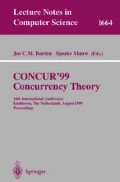Abstract of Invited Talk
Research in the specification and verification of concurrent systems falls into two general categories. The temporal logic school advocates temporal logic as a language for formulating system requirements, with the semantics of the logic being used as a basis for determining whether or not a system is correct. The process-algebraic community focuses on the use of “higher-level” system descriptions as specifications of “lower-level” ones, with a refinement relation being used to determine whether an implementation conforms to a specification. From a user’s perspective, the approaches offer different benefits and drawbacks. Temporal logic supports “scenario-based” specifications, since formulas may be given that focus on single aspects of system behavior. On the other hand, temporal logic specifications suffer from a lack of compositionality, since the language of specifications differs from the system description language. In contrast, compositional specification is the hallmark of process algebraic reasoning, but at the expense of requiring what some view as overly detailed specifications. Although much research has studied the connections between the temporal logic and process algebra, a truly uniform formalism that combines the advantages of the two approaches has yet to emerge.
In my talk I present preliminary results obtained by Gerald Lüttgen, of ICASE, and me on the development of such a formalism. Our approach features a process-algebra-inspired notation that enriches traditional process algebras by allowing linear-time temporal formulas to be embedded in system descriptions. We show how the combined formalism may be given a uniform operational semantics in Plotkin’s Structural Operational Semantics (SOS) style, and we define a refinement relation based on Denicola/Hennessy testing and discuss its congruence properties. We then demonstrate that traditional temporal-logic-style arguments about system correctness can be naturally captured via refinement; we also illustrate how the combination of logical and system operators allows users to define systems in which some “components” remain specified only as formulas.
Research supported by NSF grants CCR-9257963, CCR-9505562 and CCR-9804091, AFOSR grant F49620-95-1-0508, and ARO grant P-38682-MA
Access this chapter
Tax calculation will be finalised at checkout
Purchases are for personal use only
Author information
Authors and Affiliations
Editor information
Editors and Affiliations
Rights and permissions
Copyright information
© 1999 Springer-Verlag Berlin Heidelberg
About this paper
Cite this paper
Cleaveland, R. (1999). Temporal Process Logic. In: Baeten, J.C.M., Mauw, S. (eds) CONCUR’99 Concurrency Theory. CONCUR 1999. Lecture Notes in Computer Science, vol 1664. Springer, Berlin, Heidelberg. https://doi.org/10.1007/3-540-48320-9_1
Download citation
DOI: https://doi.org/10.1007/3-540-48320-9_1
Published:
Publisher Name: Springer, Berlin, Heidelberg
Print ISBN: 978-3-540-66425-3
Online ISBN: 978-3-540-48320-5
eBook Packages: Springer Book Archive

